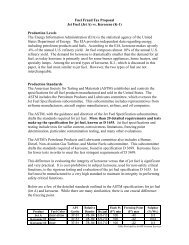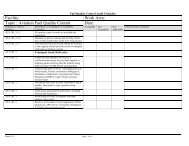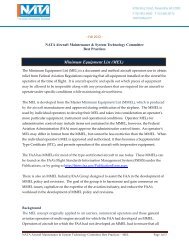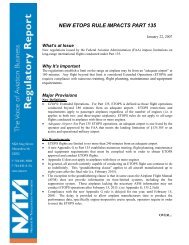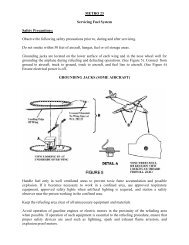Bridgeford Flying Services: A Vintage Napa Valley FBO You ... - NATA
Bridgeford Flying Services: A Vintage Napa Valley FBO You ... - NATA
Bridgeford Flying Services: A Vintage Napa Valley FBO You ... - NATA
You also want an ePaper? Increase the reach of your titles
YUMPU automatically turns print PDFs into web optimized ePapers that Google loves.
<strong>You</strong>’ve Been Served!<br />
Continued from page 17<br />
time and place, typically to provide<br />
deposition testimony and/or<br />
produce documents and records.<br />
A subpoena may also request the<br />
recipient’s attendance to testify at<br />
a hearing or trial.<br />
Subpoenas are commonly<br />
served as part of a civil lawsuit<br />
between two or more adversaries<br />
in the course of investigating<br />
the facts of their case through a<br />
process called “discovery.” Parties<br />
often serve subpoenas on nonparties<br />
during discovery to obtain<br />
information, documents, or testimony<br />
relevant to the dispute.<br />
Depending on the jurisdiction<br />
(state or federal), the authority<br />
issuing the subpoena may be a<br />
clerk of the court, a notary public,<br />
or even an attorney for one of the<br />
parties to a lawsuit. A subpoena<br />
typically contains a caption setting<br />
forth the name of the case<br />
(which identifies the litigants) and<br />
the court through which it was<br />
issued. Most jurisdictions have<br />
requirements governing how a<br />
subpoena must be served. Generally,<br />
a subpoena may be served by<br />
any adult who is not a party to the<br />
litigation.<br />
If the subpoena is properly<br />
served and meets other formalities,<br />
it requires compliance. Refusing<br />
to comply with a valid subpoena<br />
can subject you to sanctions,<br />
including being found in contempt<br />
of court or being responsible for<br />
the issuing party’s attorney fees,<br />
neither a particularly pleasant outcome.<br />
Subpoenas Requesting<br />
Documents and Records<br />
A special type of subpoena,<br />
known as a subpoena duces tecum<br />
from the Latin “bring it with you,”<br />
requires the recipient to bring<br />
records, reports, documents, or<br />
other evidence to a deposition or<br />
court. Sometimes the subpoena<br />
or accompanying letter indicates<br />
that a person need not appear<br />
in person to testify so long as<br />
documents are produced within<br />
a specified period. Sometimes<br />
a party seeking documents will<br />
direct a subpoena to a person who<br />
has possession of the documents<br />
rather than the person who owns<br />
the documents. An example of<br />
this could be a subpoena to your<br />
bank directing it to produce your<br />
financial records.<br />
As a general rule, when a formal<br />
request for documents has been<br />
made, the documents may not<br />
be altered or destroyed while the<br />
request is pending. To destroy<br />
records under such circumstances<br />
is referred to as “spoliation.” Upon<br />
receipt of a subpoena for documents,<br />
an effort must be made to<br />
determine the specific documents<br />
that are within the scope of the<br />
request and then ensure that they<br />
are maintained and not disposed<br />
of until you and your attorney<br />
determine the particular form of<br />
response to be made.<br />
Subpoenas from the FAA<br />
and Other Legal Orders<br />
The FAA may subpoena witnesses<br />
and records in connection with<br />
an investigation. The FAA subpoena<br />
power is broad, and an FAA<br />
subpoena is valid and enforceable<br />
so long as the FAA is acting in<br />
its authority and the information<br />
sought is “reasonably relevant” to<br />
the inquiry.<br />
A subpoena for testimony or<br />
documents of the sort discussed in<br />
this article is not the same as a letter<br />
of investigation from the FAA.<br />
A letter of investigation is a formal<br />
document that notifies an alleged<br />
violator of a regulation of the activity<br />
being investigated. It specifies<br />
the time for reply and may<br />
include a request of documents to<br />
be retained or made available for<br />
inspection and copying.<br />
A subpoena is also different from<br />
other legal instruments that<br />
compel disclosure, testimony, or<br />
document production, such as a<br />
search warrant, national security<br />
letter (which the FBI and some<br />
other federal agencies can order<br />
in connection with international<br />
terrorism and counter intelligence<br />
investigations), or a court order.<br />
A discussion of the letter-of-investigation<br />
process, search warrants,<br />
national security letters, and the<br />
like is outside the scope of this<br />
article, and the recipient of any<br />
such instrument should not delay<br />
in seeking legal advice.<br />
Somebody Just Served Me;<br />
What Do I Do Next?<br />
As a subpoena recipient, your<br />
objectives include protecting your<br />
legitimate business and privacy<br />
interests, fulfilling your obligations<br />
to comply with a valid legal<br />
order, and avoiding undue time,<br />
burden, and expense, including<br />
sanctions for failure to comply as<br />
required. Accomplishing each of<br />
these goals at the same time can<br />
present a challenge, which is why<br />
enlisting the help of a qualified<br />
attorney is important.<br />
One of the first things to consider<br />
is what your interest is in the<br />
case or investigation that prompted<br />
the subpoena. If it was issued<br />
in a commercial dispute among<br />
two private litigants, you may<br />
have no interest in the matter but<br />
merely be in possession of some<br />
information or documents relevant<br />
to the dispute. On the other<br />
hand, you could be the target of a<br />
potential lawsuit yourself. Similar<br />
considerations apply if you<br />
receive an investigative subpoena<br />
from the FAA. <strong>You</strong> could be a<br />
bystander or a potential investigation<br />
target.<br />
It is critical that you do not<br />
delay taking action when you<br />
receive a subpoena. Don’t “file” it<br />
Continued on page 20<br />
18 Aviation Business Journal | 2 nd Quarter 2008



